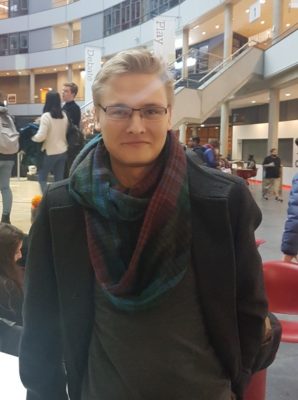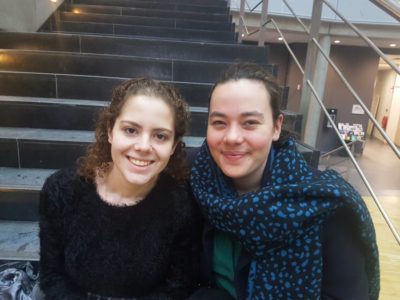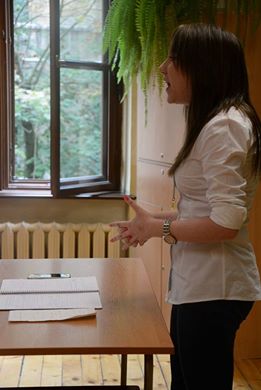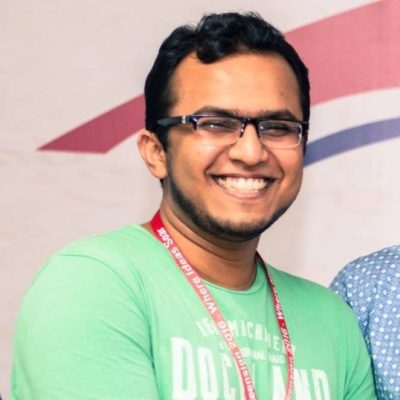WUDC Tips and Tricks from Veterans – Part 2
There’s no other time in the year where more outstanding, successful, brilliant, superb, mind-blowing, astonishing, fascinating debaters meet at one location then whilst WUDC. That makes worlds the perfect time to talk to some of these people and get them to share their secrets to success. We have spoken to three more people from The Netherlands, Israel, Bangladesh and Germany. The interviews were conducted by Helena Hecke.
In this Article you’ll hear about the tricks of the trade from
Marc-Andre Schulz – Aachen
Emma Lucas and Gigi Gil – Leiden
Monica Forman – Tel Aviv
Ratib Ali – Dhaka

Marc-Andre Schulz – ©Helena Hecke
Marc-Andre Schulz – Aachen
Marc-Andre is one of the few rather internationally active members of the German debating scene, having started 2010 in the German circuit and several years ago turned towards the international circuit. During those years he went to and broke at several tournaments. The biggest success so far was making it into the ESL-final of Thessaloniki Worlds.
On what to do before Worlds:
AM: How many tournaments did you go to in order to prepare for Worlds?
MAS: I think it were four tournaments in the months before worlds, maybe five.
AM: Do you have some sort of routine to get better?
MAS: We met up once or twice a week, went through motions, did the PM and LO speeches.
AM: How did you prepare to get more background knowledge?
MAS: We tried to figure out the areas most problematic and then tried to selectively read up on them. But not much actually.
AM: How did you prepare to get better as a team with your partner?
MAS: To be honest, we didn’t do that much. We always worked under the assumption that when we would do well individually, it would work out as a team as well.
On what to do at Worlds:
AM: How do you use the preparation time effectively?
MAS: In general, we have a bit of a check list we go through.
AM: And what does this check list look like?
MAS: They contain a couple of things that I noticed I tended to miss, if I didn’t follow some structured formula. Something like always doing keyword analysis, always explicitly defining all of the words, doing stakeholder analysis, etc. Nothing too specific. Trying to not forget anything obvious.
AM: How do you cope with tricky PoIs?
MAS: If I can’t answer on the spot, I usually tell that my partners material will deal with that and leave it to him.
AM: How do you use feedback that is given to you by judges?
MAS: We try to have a debate diary where we accumulate feedback.
AM: How does it feel to break at worlds?
MAS: Nice, I suppose.
Emma Lucas and Gigi Gil – Leiden

Gigi Gil (left) and Emma Lucas – © Helena Hecke
Emma and Gigi are some more top European debaters.
Gigi right now has not even been actively debating for more than two years and already managed to break at both Worlds and Euros and might well break again this Worlds. She’s so far had roughly 30 breaks as speaker. As adjudicator, she also broke at about 25 tournaments. Her proudest achievement is reaching the top 10 speakers at EUDC 2016.
Emma is in her third year of university debating but gathered some experience back in school as well. She went to two euros, breaking at both. At Warsaw EUDC 2016 she made it into the ESL final and also broke open [double breaking is possible at EUDC, editor’s note]. At Thessaloniki Worlds she reached the ESL-semi-finals. As a speaker she broke at about 20 tournaments and as an adjudicator at 15.
On what to do before Worlds:
AM: How many tournaments did you go to in preparation for Worlds?
GG: We did four. Durham, Oxford, Cambridge and Riga. They were all very close to each other. There was one week between Durham and Oxford and Oxford and Cambridge and then two between Cambridge and Riga. So that was intense, but it was good, because we really got into it. More of our work went into watching documentaries. A lot of them, because we thought we needed some more knowledge about the world. So we watched 50 minute documentaries and we watched like 50 of them. That was the most important prep for us.
EL: The other part in prep is, that you have to find a partner that you’re comfortable with, because sometimes it gets quite boring.
AM: Did you have some special routine to get better apart from watching documentaries?
GG: I don’t really think we do.
EL: Probably just prepping.
GG: We tried to do as many debates as we could at the evenings in Leiden. We don’t have a real routine. I know that some Leiden teams have far more of a routine. I know that Lisa has this routine for her nails.
EL: Floris and Devin do push-ups in the morning.
GG: They do work-outs every morning.
EL: We don’t do that. We just sleep and have lots of coffee. Coffee is essential, though.
AM: How did Leiden chose the two of you as a team?
EL: We had trials where there were three judges, who were picking who was speaking together. We also kind of picked ourselves. Because we were like “We want to speak together and you have to let us speak together, please”.
GG: We’re the first all female team from Leiden in eight years and we started joking that we wanted to be a team together and people started to make jokes on that.
EL: Like that we’d be too hysterical to be on a team.
GG: And we thought that they were probably insinuating sexist jokes. So we basically pushed for an all female team. And the other teams were very supportive with that, although Emma and Floris broke open at Euros. However, it was very close between Floris, Devin, Emma and me and the former teams also were successful combos, but at the end we got the support because all the teams agreed on wanting a successful female team as well.
On what to do at Worlds:
AM: How do you use your preparation time most effectively?
GG: Here you usually need to walk around a lot and can’t write anything down. I’m first speaker, so I have to write and I’m not able to write anyways, so we try to talk as much as possible, kind of like: Do we understand the context of the debate? What kind of ideas do we think we have to consider? Usually after about five to seven minutes we stop talking and I need to start writing and I write down all the mecs I need as well as their impacts.
EL: I think about possible other cases that could be brought on opposition. That’s mainly what I bring to the team part. I think we often talk again at about 13 minutes and go through our analysis for anything I can add.
AM: Any suggestions on what to do when you’re nervous?
GG: I used to hate PM speeches, because I thought you’d debate in a vacuum and you’d not really be relevant. The difference between a decent PM and an exceptional PM is pretending to know your shit. I always tell my friends to be very arrogant. I always tell Lisa to put her balls on the table and to just go for it, because the more certain you seem to be, the less uncertainty other teams can find.
EL: Also I think in general you pretend you are very, very certain about yourself, be fierce, secure. If you walk on and be like “Oh I don’t know what I’m going to say”, they’ll percieve weakness. So you have to just stand up and give that speech and then usually, your actual feelings follow the way you behave. I also don’t talk to other people that freak me out. I know that some Leiden teams have the tendency to talk about “Who is on which points” and stuff and sometimes you just have to walk away and not deal with that. Just listen to music you like or watch a movie or whatever. Just not get too involved into debating.
AM: How do you deal with very tricky PoIs?
GG: People would just bring some examples no one would know, like “Would you also defend bla, bla, bla in a year”. I either go: If it’s consistent with our case then yes, which I don’t really like as an escape. I normally take five seconds. I used to just start talking and then you never find your way in. If you just think about it for like five seconds, no one will think you’re wired, but you can calm down, breath and gather your thoughts.
EL: Sometimes I take PoIs at the point in the debate I’m the least comfortable with, because I think there is the biggest gap in our analysis, because that way you’ll usually be pointed to what is still missing and that way you still can come up with a way to get through it. I also think that as a second speaker it is important to consider that the content of the PoI might be something which has already been said in the debate. If a PoIs is about something that Gigi has said already, I try to find a way to use her material and usually say “Gigi has already said that”.
AM: How do you use feedback given to you after a debate?
EL: I think we’re currently at a stage where we often know where we are wrong. In that case the judge will tell you the same. If it is a judge, who has seen you several times, you can ask them about general things, which I think is not very helpful anymore at Worlds, because at a certain point of time you’re done with training and just have to deal with it. But I think in prep tournaments you can find a more systematic approach.
AM: How does it feel to break at Worlds?
GG: I freaked the fuck out! We didn’t expect to break, because we did badly in the first six rounds. We were on 6 points after round 5 and got another 11 in the last four and we missed the open break on speaks and it was wired as shit and I like freaked out. But my favourite moment was when I called my Mum. And I was like “I broke at Worlds” and she was like “Wait one sec” and then she called my dad and they always do the same thing. He went “well done” and my mum “Woohooo” and that was it. I think they didn’t really grasp how excited I was.
EL: Last year we also didn’t think we’d break because we did pretty well at the first two days and then we just got stomped for the last three rounds and lost them all. We got like 12 points in the first 6 rounds and then like 2 or 3 in the last day. We basically lost all the debates. Then we broke and I was really really excited and the thing I loved most were the out rounds, because they’re a little bit more about public speaking and very relaxed.
GG: We were also in the same semis.
EL: I think it was in that debate that I decided I want to speak with Gigi, because both our partners were like “You can’t speak to me! I have to write my CV and be concentrated” and we were just like…
GG: … “Hey! How are you doing. Wooho!”
EL: We knew then.
AM: Thanks a lot for the interview and good luck for the rest of the tournament.
Monica Forman – Tel Aviv

Monica Forman – © Privat
Monica is a record holder. She managed to break at Euros an incredible six times, doing so in six consecutive years. She has broken at “many” tournaments, which varies between “several” and “every tournament in existence”. She might have won more tournaments than some debaters have attended, including four internationals as well as many national tournaments.
On what to do at Worlds:
AM: How many tournaments did you go to before worlds?
MF: It depends. When I just started to debate it wasn’t that common for Israeli teams to travel abroad. I generally do recommend to go, if you have the possibility. Regardless of which tournament you choose. The learning curve you will see is great, because you get to experience many different judging styles. Even for us Israelis, who are blessed with such an extensive judging pool we can choose from, it’s educational just to find out about new styles. If you can only go to few tournaments, go some weeks before Worlds, so you can implement some of the feedback and ideas into your training. If you can only go to one tournament, you should go to one directly before Worlds, especially when you’re nervous or a little rusty. It’s good to take the jinx off.
AM: Do you have some sort of routine to get better?
MF: When at home: Debate at least twice a week, full debates. I often meet with my partner and we constantly do debate related tasks we give each other. It could be simply prepping, making cases or it could be each making a short speech and the other rebutting. It’s a) good practice, but more importantly b) helps to communicate with your partner.
Before a tournament: Read, read, read!
AM: What did you do to get more background knowledge?
MF: I read a lot. First of all news. There is not much difference about the language you read in. It just has to be a good newspaper, but can well be in German or Hebrew. It will be very good for your base knowledge. But for things I find to be important, I’d start reading more opinion articles or additional material to start seeing how people see or analyze it. So not only about the facts, but more of: If I was to argue about it, regardless of what specific model, where could I attack it from? Here I would go for things in English like Economist, Guardian, Washington Post, …”
AM: How did you prepare with your partner to get better as a team?
MF: As I said, we met together, we debate a lot. For me it’s a personal thing. But I think it helps to be friends with your partner. It’s good to do things together which are not related to debates, just for you to know the person, have a common language and understand how they think.
AM: How did your society choose you and your partner as a team?
MF: We have trials in Tel Aviv and my previous university, it was up to our coach to decide that.
AM: How do you use the preperation time effectively?
MF: So I’d start with two minutes of silence. Just thinking for myself. If I didn’t know what the debate was going to be about, I’d ask my partner to clarify if we understand the motion the same way. Otherwise I’d just start thinking for ideas myself. Then we’d try to come up with a case from those idea. Meaning we’d see what the most important things are, what has to do with necessarily proving the motion, what we think doesn’t contradict each other. Basically a case that stands and not just random points and then after deciding that, we’d distribute the points among us, depending on who speaks first. Then we spend more time alone on developing the arguments and during that time we have additional ideas or thoughts that we believe we must tell the other.
AM: Do you have any suggestions what to do when you’re nervous?
MF: I know that music helps some people. I’m more for the approach “fake it till you become it”. Remind yourself that you’re good, it’s not the first time you’re debating and, although it’s a tournament, things are not much different from what you’re used to . Try to go for cases that you enjoy doing. Even if you don’t win the debate, you know you enjoyed it and did something you believed in and you can go out and be proud of that.
AM: How do you cope with tricky PoIs?
MF: This is an advice I also give to the students I teach: Always try and think about the meaning behind these PoIs. Don’t assume that the other side is silly or doesn’t know what they’re asking, usually these tricky PoIs would be in form of analogies. Try to spot the analogy and if you decide it’s not analogous, say it’s an exception and deal with it accordingly. If you’re not sure, always give the answer that you think is right and tell your partner will deal with it. After your speech, tell you partner you don’t think you’ve dealt with it sufficiently.
AM: How should feedback be used?
MF: So first of all write everything down. Even if you don’t understand it now. I wrote down feedback that I got and only understood it after I thought about what happened and I ended up agreeing to it. So I think it’s important to have some record of feedback. Also I tend to get over it after a tournament, sit back, relax and try to find out what are the common patterns and think about how to do better. On a more serious note: Always take it serious. If the chair judge and panelist thought that you didn’t take the first, there is some sort of reason for it. It can not be out of thin air. Be respective of that and always think about how you can win each room and not necessarily repeat what you did, even if you’re very good.
AM: Last question: How does it feel to break at worlds?
MF: It’s incredible. It’s really fun. Especially breaking open. We felt like we did history, because not many ESL teams do that. It’s very great.
Ratib Ali – Dhaka

Ratib Ali – © Privat
Some people try several times and never manage to win worlds. Ratib goes once and wins. He, who used to debate for BRAC University in Bangladesh, has six years of debating experience, but he had just been debating for three years, when he won the ESL-final. Last year, he broke in every tournament in Bangladesh and won half of them.
On what to do before Worlds:
AM: How many tournaments did you go to in order to prepare for Worlds?
RA: In the six months leading up to worlds we did a tournament every weekend.
AM: Did you have some sort of routine to get better?
RA: No. We just hated other people who debated with us. It was good motivation to do better than them.
AM: How did you prepare to gain more background knowledge?
RA: We just read stuff that interested us. So I’m an econ-major. I like economy stuff. My partner likes wars, because he is a violent, violent person. We just read The Economist or foreign policy and what would interest us. What we did do however, to get into gender motions, was to go to Stanfords Encyclopedia of Philosophy and go through the articles that we understood. In some of them the English is just not understandable.
AM: What did you do to get better as a team?
RA: Just trust the other person’s call. We’re not alike, we’re very different people, we rarely hang out in circle together. We were just really fortunate. Going to tournaments does help to grow together.
On what to do at Worlds:
AM: How can you use preparation time effectively?
RA: I ask myself: Why this motion, what are we doing, what do we stay for? The questions: Who, why, what, where, how.
AM: Any tips what to do when one gets really nervous?
RA: Believe in yourself. I know it’s easier said then done. But one half of confidence really helps you deliver the argument better and the other half of confidence tells the judge you know what you’re talking about. It’s also a mind game and you really want to come of as someone who knows what they’re doing. Maybe just have an outwordly expression of confidence. Broad shoulders, stand up straight, speak in difficult words. Just fake that you have the control.
AM: How do you cope with a very tricky PoI?
RA: Well. Back in the day, I’d say: “I’ll answer you in a minute”. Probably – and this is not the ethical way to do it – it is often working to just take the PoI on a tangent and answer it on that tangent. But it’s certainly not ethical.
AM: How do you use feedback that is given to you?
RA: To change the kind of questions we specifically ask during prep time. What question could come first, what questions should we prop together and should we restructure the speech? How could we have done better?
AM: What does it feel like to break at Worlds?
RA: Relief.
hh/jm.





